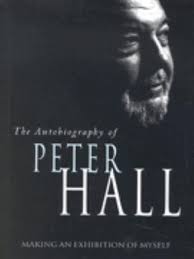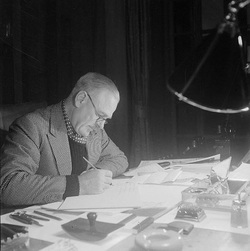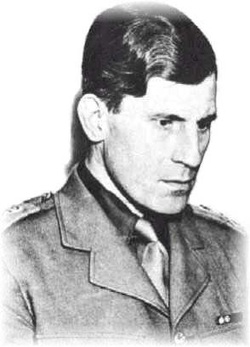
Great theater directors come in two varieties. The first type possesses a genius for artistic innovation and experimentation, often aggressively changing techniques and platforms with each passing year. The second type possesses a relentless drive for making a permanent mark on the institutional idea of ‘theater.’ As such, they get behind a range of long-term projects; they cultivate the careers of particular actors and playwrights, and they build new art houses. The second sort of great theater director must be an impresario, not just a director; they possess a multitudinous vision, not merely perspective. They take chances on material with gut instinct, but follow up success with unrivaled enthusiasm—they also quickly recover from failure, for they drop a project with little chagrin and often recognize a project’s chances of success better than anyone else.
Peter Brook, John Barton, and Julie Taymor fit into the first category. Their failures are often as colossal as their successes. The wide variability occurs because they follow up a failure as readily as a success—they cannot quite tell the difference between the two. Their successes (and failures), however, are wholly unique and often require their presence to achieve ideation, much less consummation. The first type of genius makes for an exciting theater scene, the second type makes for a historically sustainable theater. ‘Sustainability’ is a boring word, but it implies a lasting contribution to art, not just to a moment.
Peter Hall fits into the second type—indeed he defines it.
Hall came into the world in 1932, born to Suffolk parents of agrarian stock. He first attended playhouses in the shadows of the Second World War, during which time he saw many of the actors he would soon direct crossing the boards of the Old Vic and the West End theaters. Hall proved to have a gift for piano and a gift for literature. His skills eventually brought him to Cambridge, but not before serving as a post-war skills instructor in the Royal Air Force. At Cambridge, he met a young don named John Barton, and together they honed their skills in verse and play analysis. Through luck and perseverance, Hall rose quickly in the professional ranks.
Perhaps his greatest stroke of luck came in 1955 when he directed the English premier of Samuel Beckett’s Waiting for Godot. The actors first thought of the play as a sort of prank, but rehearsal revealed ‘much comedy and a dark seam of terror.’ The notices that followed the premier decried it as the sort of foolishness that appeared in Berlin in the twenties. But Hall, though frightened, did not give up. His friend Peggy Ramsay encouraged him to request coverage from Harold Hobson, who provided a review that ‘developed into the kind of panegyric that theatre people imagine in paradise.’
The incident concerning Waiting for Godot is telling. Hall found pleasure in Beckett’s poetic language; he cajoled intuitive and convincing performances from the actors; met with critical resistance, he worked until he found a critic that championed the play. A Peter Brook would have surely staged the play as well, but Peter Brook might have been perfectly content with the miserable reception in the press. Hall worked tirelessly to bring about not just a play, but an event. And that is the difference between an impresario and a director.
His success with Beckett led to lasting relationships with Tennessee Williams and Harold Pinter, and eventually led him to founding the Royal Shakespeare Company in Stratford. Mid-career, he began directing opera productions, especially Mozart. He then moved to the Royal National Theatre, an institution that at one time threatened the existence of his first love, the RSC. He led the National through the silliness of the Thatcher years, when Whitehall rewarded each financially successful subsidized production with threats of decreased funding—Her Majesty’s Government at that time (as in ours) treated the subsidized theaters like crack addicts crawling out of the gutter rather than as the most successful artistic institution of modern times. Peter Hall, anyhow, persevered against the foolishness and left British theater in good shape for subsequent generations. The battle continues to this day.
Hall writes his autobiography with humor and surprising honesty. He laughs at himself, as well as others. He also places key moments in British theater into wider artistic perspective. To be sure, this is not a neophyte’s guide to the world of British theater. He expects his reader to know something about British drama; without that knowledge, many of the jokes pass by with little fanfare. For fans of British theater, the book proves rewarding. For theater artists of any ambition, the book proves indispensible. Hall provides personal accounts of developing some of the most important plays of the 20th century. He ably explains their place in his own life, and the effect they had on him and on British theater in general. When a play flops, he explains why, and usually blames the artistry rather than the press.
Hall pushes against short-sighted economic logic with his brilliant and honest brand of impresario logic. “Any theatre conducts its own very efficient market research every night of the year: if no-one comes, we know we should not have done the play, for a play without an audience is communicating nothing.” His statement represents more than logic, doesn’t it? It represents wisdom, and a profound understanding of his craft and purpose. Peter Hall possesses vision, not just perspective.
“In all this muddle,” he writes of the late 20th century, “it has been refreshing to work in the arts. Art is absolute. It provides unquestionable integrity and inescapable standards.”
And that is art’s indispensible purpose—to provide an idea of the good, and to suggest its possibility through aesthetic form, however implausible its achievement might be.
The book also depicts his five engagements and four marriages, but he writes too generously to let any lasting resentment creep into the book (though his feud with John Osborne might be an exception). One gets the sense that one knows Peter Hall. He fills the text with anecdotes, and sudden dashes from one story to the next. He structures the book with rapid-fire chapters that center on a single theme, supported with a few paragraphs.
The autobiography represents a great achievement, and an essential contribution not only to the history of theater, but to the major British cultural developments of the last sixty years.


 RSS Feed
RSS Feed